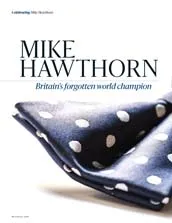Worse, though, much worse, was to come. In the closing laps the third Vanwall, driven by Stuart Lewis-Evans, seized its engine at around 160mph, and in the ensuing accident a fuel pipe was broken. Terribly burned, Lewis-Evans got himself out of the car, but he was to die six days later, after returning to England on Vandervell’s charter flight, lying on a stretcher, attended only by a nurse. Not all was good about the old days.
As the race went into its late stages. Ferrari duly instructed Hill back off, allowing Hawthorn into second place, and at the finish the red cars were 25 seconds behind Moss. Final points totals: Mike 42, Stirling 41.
I was late into school chapel that Sunday evening, having hung around outside, my ‘transistor’ clapped to my ear, waiting for the news from Morocco. When they said that Moss had won, my spirits momentarily soared, for I was an avid fan – but then they added that Hawthorn had been second, and thus become World Champion, despite winning only one Grand Prix to Stirling’s four.
A lot of decisions were made in those hours following the race. Hawthorn told the Ferrari management that he was retiring, and Moss resolved in future to worry less about the World Championship. Tony Vandervell, appalled by what had befallen Lewis-Evans in one of his cars, decided that enough was enough. Vanwall had won the Manufacturers Championship, but for the boss it was the team’s darkest hour.
The following week, Autocar said this: “‘The sportsmanship and friendly spirit that (Moss and Hawthorn) have shown to the other throughout the season has been a pleasure to watch and should settle once and for all any suggestion that motor racing is a cut-throat business in which there is little room for finer feelings and good sportsmanship.”
Ah me.





